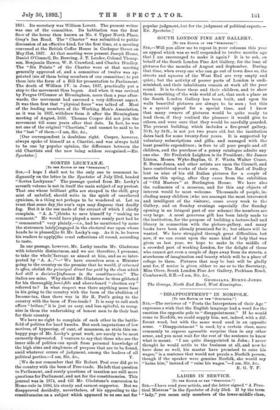SORTES LECKYAN2E.
[To THE EDITOR OF TER "Brzor•Toa."3
SIR,—I hope I shall not be the only one to comment in- dignantly on the letter in the Spectator of July 23rd, headed " Sortes Leckyanw." The passage quoted from Mr. Lecky's seventh volume is not in itself the main subject of my protest. That one whose brilliant gifts are steeped in the chill, grey mist of unbelief, should write in the spirit of unrelieved cynicism, is a thing not perhaps to be wondered at. Let us trust that some day.the sun's rays may disperse that deadly fog. But it is the use made of the extract of which I chiefly complain. "A. A."Ainks to save himself by "making no comment." He would have played a more manly part had he "commented" very plainly,—i.e., had he mentioned by name the statesmen latelyZengaged in the electoral war upon whose heads he is pleased;to fit Mr. Lecky's cap. As it is, he leaves his readers to applyEthe cruel reflections all round, according to taste.
In one passage, however, Mr. Lecky insults Mr. Gladstone with tolerable distinctness, and we are therefore, I presume, to take the whole:farrago as aimed at him, and as so inter- preted by "A. A. :"—" We have ourselves seen a Minister going to the country on the promise that he would, if returned to office, abolish the principal direct tax paid by the class which• had still a decisivelinfluence in the constituencies." The italics are mine. Why should Mr. Gladstone be thus gibbeted for his thoroughly_bond-fide and above-board "election cry" referred to P In what respect was there anything more base in his going to the country with the boon of the abolition of Income-tax, than there was in Sir R. Peel's going to the country with the boon of Free-trade ? It is easy to call such offers "bribes ;" it is just as easy, and less spiteful, to recog- nise in them the undertaking of honest men to do their best for their country.
We have no right to complain of each other in the battle- field of politics for hard knocks. But such imputations of low motives, of hypocrisy, of cant, of meanness, as stain this un- happy page of Mr. Lecky's great work, are surely to be most earnestly deprecated. I venture to say that those who see the inner side of politics can speak from personal knowledge of the high aims and singleness of purpose that are to be found, amid whatever errors of judgment, among the leaders of all political parties.—I am, Sir, &c., Y.
[We do not remember that Sir Robert Peel ever did go to the country with the boon of Free-trade. He left that question to Parliament, and surely questions of taxation are still more questions for Parliament, and not for the constituencies. This journal was in 1874, and till Mr. Gladstone's conversion to Home-rule in 1886, his steady and earnest supporter. But we disapproved decidedly, nevertheless, of his appealing to the constituencies on a subject which appeared to us one not for popular judgment, but for the judgment of political experts.— ED. Spectator.]


































 Previous page
Previous page